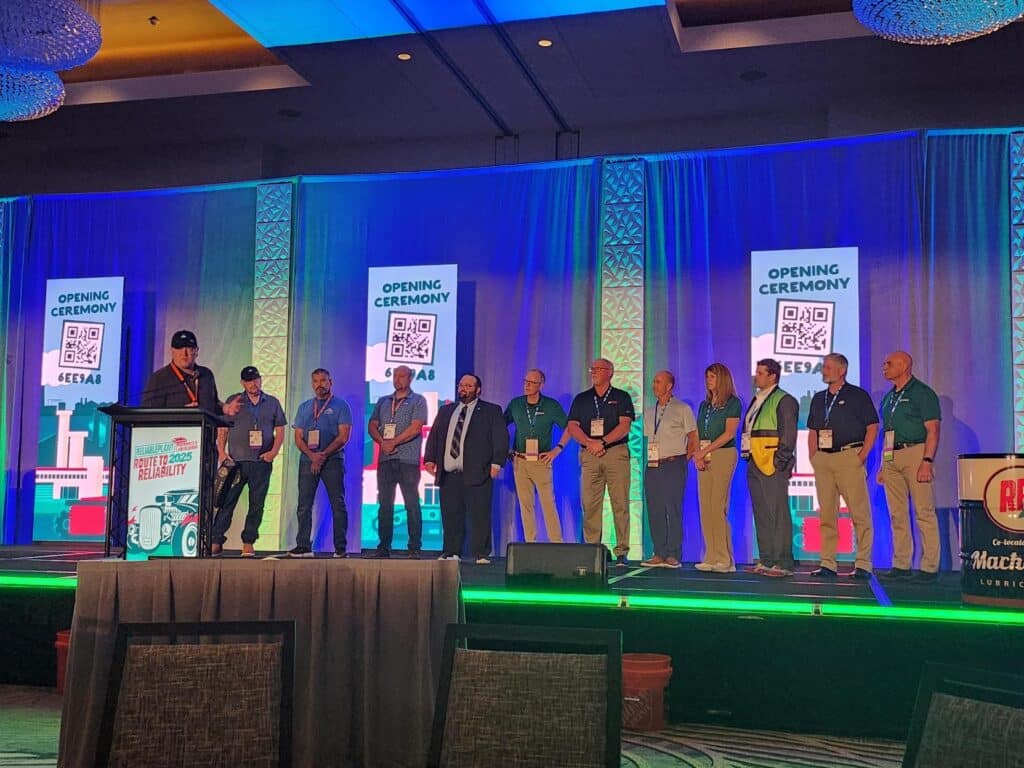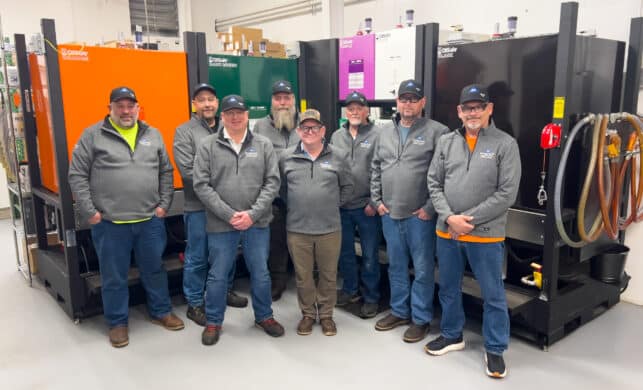When the reliability team at Georgia-Pacific’s paper mill in Toledo, Oregon, looked at their lube room just a few years ago, they saw more than just a cramped, cluttered space—they saw an opportunity. Now, after a complete overhaul grounded in best practices, team ownership, and unrelenting focus, they’re celebrating a major milestone: winning the 2025 Lube Room Challenge.
Led by Reliability Supervisor Billy Abbott, the Toledo team reimagined their lubrication program from the ground up, transforming a once disorderly environment into a clean, efficient, and contamination-controlled hub that’s setting the standard across Georgia-Pacific and the broader industry.
“This lube room is the foundation of our reliability program,” said Abbott. “Once we understood what lubrication best practices really meant, we realized everything had to start here.”
Watch the video to see how Georgia-Pacific Toledo transformed their lube room.
From Struggle to Structure
The team’s journey began with training—MLT I and MLA I certifications from the International Council for Machinery Lubrication (ICML) that gave them a shared understanding of lubrication fundamentals and contamination control. What followed was not just a redesign of a room but a cultural shift in how the plant views and executes lubrication.
Abbot indicated that In the beginning, they were just stacking drums wherever they could fit them. There were multiple concerns, including several inefficiencies and a general lack of consistency in how oil was handled. But they knew we could do better.
Armed with a vision and drawing inspiration from other GP sites, the Toledo team took ownership of the process. They sketched layouts by hand, collaborated with suppliers to consolidate lubricant types, and chose equipment like OilSafe containers and Hy-Pro filtration carts that matched their goals.
“We wanted the team to own it,” Abbott emphasized. “They laid it out, designed it, and built it. I was just there to support them.”
Engineering Reliability, One Drop at a Time
Today, the lube room features color-coded quick disconnects to prevent cross-contamination, double and triple filtration on transfers, and monthly oil sampling cycles. The result? ISO cleanliness codes are hitting record lows, and the effects are cascading out to the plant floor.
“Every time we put a new drum in, we cycle the oil for hours until it hits our target cleanliness codes,” said Phillip Moran, a lubrication technician at the plant with more than three decades of experience. “That’s not something we even thought about years ago. Now we won’t put it in an asset until it’s clean.”
Their system is dialed in. Kidney-loop filtration units constantly clean oil in use on smaller-capacity systems and samples are taken from every critical asset every month. The team now uses advanced filtration carts, strategic oil consolidation, and color-coded systems across the plant.
The impact is clear: extended asset life, cleaner samples, fewer issues in the field, and an unmistakable sense of pride.
“I’ve been doing this for over 30 years,” Moran reflected. “I never thought I’d see us hit this level. It’s state of the art now.”


A Blueprint for the Future
This lube room isn’t just a room—it’s a long-term strategy. As the last remaining lubrication tech at the plant, Moran is preparing to retire. With their new lube room and the culture surrounding it, he’s confident the next generation is ready to carry the torch.
Abbott said that they never set out to win an award with their lube room. “We just wanted to do things right.” But from the outside looking in, it’s incredibly rewarding to see these guys so excited, knowing they’ve built something that works—and that will last.
In addition to the physical transformation, the cultural shift has proven just as valuable. The reliability team now thinks proactively, understands contamination control at a microscopic level, and has earned leadership support thanks to clearly articulated plans and proven results.
“When we took this to leadership and showed them the layout, the plan, and the expected impact on reliability—they were all in,” said Abbott.
The success of Georgia-Pacific’s Toledo team offers a compelling example of how proper lubrication practices can drive operational excellence. The team encourages others to stay persistent, lean into training, and focus on the fundamentals.
“Lubrication best practices are simple,” Abbott said. “But it’s all the little things—the cleanliness, the organization, the efficiency—that really add up.”
About the Lube Room Challenge
Sponsored by OilSafe and presented by Machinery Lubrication magazine at the Reliable Plant Conference & Exhibition, the Lube Room Challenge recognizes facilities that go above and beyond in implementing world-class lubrication practices. Winners are selected based on their lube room’s organization, contamination control, innovation, and alignment with industry best practices.

Georgia-Pacific’s Toledo mill joins an elite group of past winners who understand that reliability doesn’t begin in the field—it starts in the lube room.
https://www.machinerylubrication.com/Read/32928/2025-Lube-Room-Challenge-Winner
With an OilSafe best-in-class lube room, you can transform your lube room to ensure safe, compliant, and organized storage, transfer, identification, and protection. Contact us today! https://www.oilsafe.com/contact/

